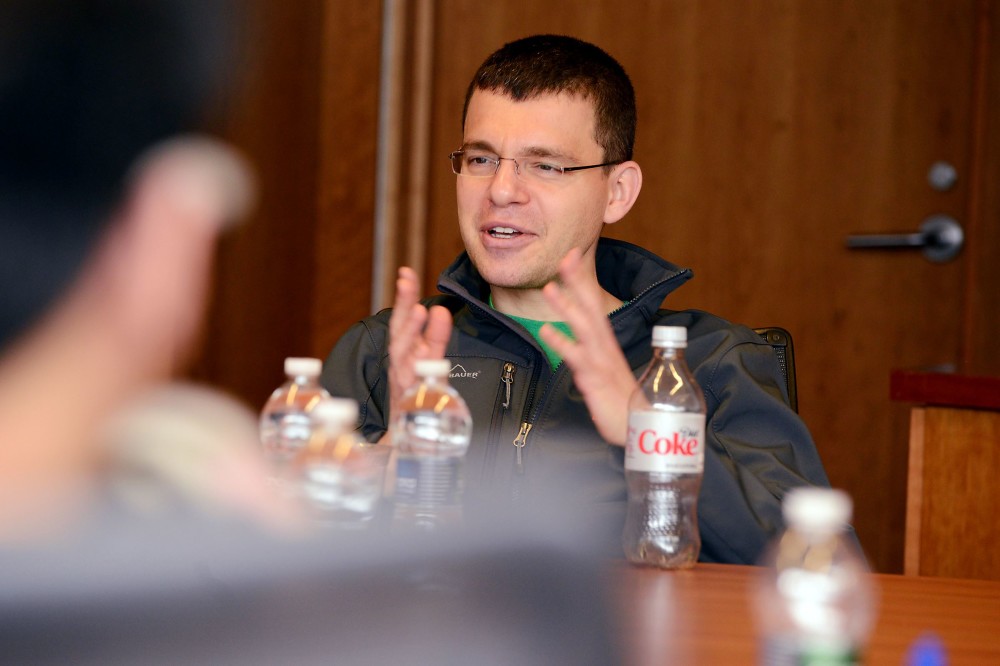By Christine Des Garennes
The News-Gazette, Champaign-Urbana, Ill.
URBANA
Women, if you’re dismayed with the number of females studying and working in technology and are thinking of leaving the field, don’t do it, says Max Levchin, entrepreneur, investor and University of Illinois computer science graduate.
In town for the Department of Computer Science’s 50th anniversary, Levchin spoke of his time as a freshman and seeing lots of girls in his computer science lectures, but over those years the numbers would dwindle. He recalled talking to one of them and telling her, “It’s not going to get better if you leave.”
During a visit to campus this week, Levchin met with students who have their own start-up dreams and delivered a keynote address on topics ranging from women in computer science to opportunities available for those studying computer science, and he provided an update on his recent business ventures.
This is “the best time ever” to be in technology, he said. “It’s cool to be a hacker. We’re desperately under-resourced.”
Levchin said the problem of few women in technology will not correct itself overnight and he wasn’t sure what the right solution is, but what is clear is the message he thinks should be delivered to children.
“You have to start in grade school. You have to start saying this is not the boys to left, girls to the right. It’s whatever you’re passionate about,” he said.
Now the father of a girl, Levchin said he doesn’t want his daughter to be pressured into pursuing a gender-appropriate role.
“If she ever says, ‘Daddy, I want to be a computer scientist, but it’s not for girls,’ I would feel I completely screwed up as a parent.”
When people talk about female role models in engineering or computer science, many point to Ada Lovelace, a British mathematician and an early programmer, or Grace Hopper, a programmer and admiral in the Navy.
Hopper died in 1992, and Lovelace died in 1852. There are fantastic women computer scientists working today, but they’re not getting much “air time,” Levchin said.
His role model was his grandmother, Frima Lukatskaya, a theoretical physicist after whom he named a computer science scholarship at the UI.
Levchin emigrated to the Chicago area from Ukraine as a 16-year-old. He had dreams of attending the Massachusetts Institute of Technology but told his counselor he wanted to go to “MTI,” and when no such school could be found, his counselor pointed him to the University of Illinois.
By the time he figured out the error in translating the abbreviation from Russian, he was already involved in tech startups on campus. He graduated in 1997.
Since then, Levchin has gone on to become associated with a few companies you may have heard of: PayPal (co-founder) and Yelp (chairman). He is on the board of directors of Yahoo and is CEO of HVF (Hard, Valuable, Fun), which he described as an incubator-type of lab.
His latest projects are Affirm, where he’s a co-founder and CEO, and Glow, where he’s chairman. Affirm is a financial services technology company and Glow is an app that tracks women’s fertility.
When asked whether he prefers to come up with cool ideas or run a company, Levchin said he likes to do both.
Most of his time now is spent working at Affirm, while HVF is an outlet for brainstorming, having fun and taking crazy risks.
It’s like an experimentation lab, or throwing spaghetti against the wall, he said.
He didn’t reveal his specific investments but did say he’s interested in energy, health care and food and water issues.
In recent years, state and city of Chicago officials have been pushing for UI computer science graduates to stay in Illinois and encouraging them to launch their start-ups here.
Levchin said as much as he enjoys his time visiting Illinois, “Silicon Valley is still the best place to start a company in America.”
The “ecosystem” has been there for a long time, he said, meaning funding, legal and other support services for entrepreneurs.
He’s supportive of the state’s aim, to keep tech talent here and help the local economies, but suggested officials create more economic incentives.
He pointed to San Francisco’s strategy to lure companies like Twitter and Pinterest to open offices there in order to redevelop parts of the city.
And New York’s program, Startup New York, advertises “no business, corporate, sales, property, state or local taxes and no franchise fees” for 10 years.
“Obviously, this has to square with tax revenue of the state before such niceties can be dispensed,” Levchin said.
“The rhetoric around ‘you should stay in Illinois because it’s your home state’ is useful at reminding them of where they’re from, and asking to stick around and help is not a bad idea.
But given this is a capitalist enterprise we’re talking about, ultimately people need to ask: What will be most helpful to my company? What will make my investors, my employees most likely to succeed?”














































































































































































































































































































































































